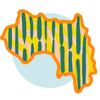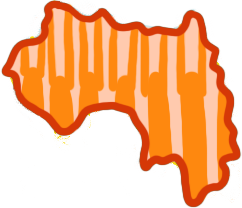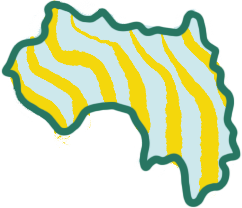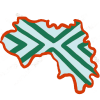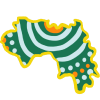Text
Thus far, we have learned how to say many things about nouns—where they are, how they look, etc—but we haven't looked formally at how to make them plural.
In this chapter, we'll cover a few things related to pluralization—including when not to do it:
- how to form plurals
- how to not use them with numbers and other quantifiers
- other times not to use plurals
How to make plurals
To make singular noun and make it plural in Maninka, you simply need to add one thing onto the end of the word: -lu.
So, for instance, we might have a word like:
sila
'road; path'
To make it plural, we would take on -lu like so:
silalu 'roads'
This system applies to all nouns that can or should be pluralized. There's no need to memorize or learn any irregular forms like in English or other Western languages. So, you can now easily say things like:
Kɛlu ye Kankan.
'The men are in Kankan.'
Like with many other words or elements that start with the letter L, things change if the preceding sounds are nasal ones. Yes, the suffix -lu becomes -nu!
For instance — if you heard a bunch of noise coming from outside and someone asked Mun ne? [What is it?]), you could respond:
Dennu le!
'It's (the) children!''
(NOTE: In Bambara and Jula, the plural is marked with the letter -w. It's an orthographic convention—the pronunciation is a [u] sound which can be traced backed to what was historically a fuller form like -lu. It's worth being aware of so that you can more easily make sense of Bambara/Jula texts that you may run into with your Maninka skills.)
(NOTE: Just a quick heads-up for those of you interested in N'ko orthography. As we have seen here, in Latin-based Maninka orthography, the plural marker is attached to the noun [e.g., kɛ + -lu = kɛlu]. In N'ko-based orthography, it is written separately as if it were two words: ߞߍ߭ ߟߎ߬ {kɛ lu}.)
Numbers and quantifiers
In English when we use a noun with a number, we make it plural so that the two agree (e.g., Two men). In Maninka, you do not need to do this. The simple fact of having a number greater than one next to the noun is enough to signal that the noun is plural.
So, for instance, we can speak of:
moso + kelen
woman + one'one woman'
Or we can speak of:
moso + saba
woman + three'three women'
Note how moso remained the same despite the fact that I added the number three (saba) to it, whereas in English, we naturally switch from "one woman" to "three women".
This dynamic also applies with determiners/adjectives related to quantity like bɛɛ ('all') or siyaman ('numerous'). For instance:
Fen bɛɛ ka di
'All things are nice'
Or:
Sɛnɛkɛla siyaman ye Laginɛ.
'There are a lot of farmers in Guinea.' (Lit. 'Farmers numerous are located in Guinea')
(NOTE: You haven't yet learned about adjectives. But it's worth noting here that adjectives (and determiner such as bɛɛ) follow nouns in Maninka [e.g., kɛ jamanjan 'tall man']. If a noun with an adjective is made plural, then the plural marker attaches to the adjective [e.g., kɛ jamanjannu and not kɛlu jamanajan
Other times not to use plurals
Similarly, there are other instances where an English speaker might want to use a plural noun, when, in fact, in Maninka and Manding in general, it's unnecessary.
This sometimes happens with the word mɔɔ ('people'), for instance. In Maninka, we naturally say:
Mɔɔ + ka + siya
Person + is + numerous'People are numerous' (as in, 'There are a lot people!')
There's no need, in this case, to say Mɔɔlu ka siya.
You'll run into other cases like this too, but it's not worth laying them all out now. Just listen carefully and try to sound like those around you!
(NOTE: Technically the difference between Mɔɔ ka siya and Mɔɔlu ka siya would be one of indefinite/definite. The former [with mɔɔ] would be 'People in numerous' whereas the latter [with mɔɔlu] would be 'The people [in question] are numerous'. But don't get caught up trying to master this subtle distinction for now.)
Summary
Ayiwa! We covered the following:
-
Nouns are made plural by adding
-luto them:kɛ 'man' → kɛlu 'men'
-
The pluralization marker
-lubecomes-nuwhen the word that it attaches to ends in nasalization:bon 'house' → bonnu 'houses'
-
If a noun is part of noun phrase with a number or a determiner or adjective related to quantity, it doesn't get pluralized:
kɛ saba
'three men'Or:
fen bɛɛ
'all things' -
Other words and contexts also do not require that a noun be plural:
Mɔɔ ka siya!
'People are numerous!'
Vocab
Coming soon n'Ala sɔnna!
- -lu/nu
- plural marker
- ninnu [nunu]
- these
- sɛnɛkɛla
- farmer
- sannina / sannikɛla
- buyer; customer; client
- siyaman
- many; a lot
- bɛɛ
- all
- talu
- possessive pronoun in plural form (e.g., 'ours; yours')
- juman/ɲiman/ɲuman
- which (one)
- jumannu / ɲimannu / ɲumannu
- which (ones)
- faama
- authority (figure); official; officer; person of means
- faantan
- poor person
- bana
- sickness; illness
- sasa
- (common) cold
- sumaya
- malaria; fever; flu (lit. 'slowness')
- borifen
- vehicle; "set of wheels" [includes bikes, etc]
- Ɛ!
- Eek! / Jeez! / Whoa!
Vocab list will be here someday!
Flashcards will be here someday!
Exercises
Exercises will be here someday!
